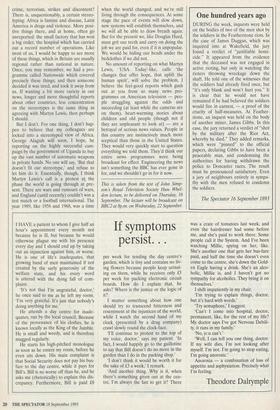If symptoms
persist.. .
I HAVE a patient to whom I give half an hour's appointment every month not because he is ill, but because he would otherwise plague me with his presence every day and I should end up by taking out an injunction against him, or worse. He is one of life's inadequates, that growing band of men maintained if not created by the surly generosity of the welfare state, and his every word is uttered with the dying fall of com- plaint.
`It's not that I'm ungrateful, doctor,' he once said to me as he left my room. `I'm very grateful. It's just that nobody's doing anything for me.'
He attends a day centre for inade- quates, run by the local council. Because of the provenance of his clothes, he is known locally as the King of the Jumble. He is small and weedy, and is therefore mugged regularly.
He starts his high-pitched monologue as soon as he enters my room, before he even sits down. His main complaint is that Social Security does not pay his bus- fare to the day centre, while it pays for Bill's. Bill is no worse off than he, and he asks me (rhetorically) to explain this dis- crepancy. Furthermore, Bill is paid £8 per week for tending the day centre's garden, which is tiny and contains no liv- ing flowers because people keep urinat- ing on them, while he receives only £5 per week for packing electronic circuit boards. How do I explain that, he asks? Where is the justice or the logic of it?
I mutter something about how one should try to transcend bitterness and resentment at the injustices of the world, while I watch the second hand of my clock (presented by a drug company) crawl slowly round the clock-face.
`I'll continue to protest to the top of my voice, doctor,' says my patient. 'In fact, I would happily go to the guillotine to say that Bill doesn't do no more in the garden than I do in the packing shop.'
`I don't think it would be worth it for the sake of £3 a week,' I remark.
`And another thing. Why is it, when there's something given out at the cen- tre, I'm always the last to get it? There was a crate of tomatoes last week, and even the hairdresser had some before me, and she's paid to work there. Some people call it the System. And I've been watching Millie, spying on her, like. She's another one that gets her bus-fare paid, and half the time she doesn't even come to the centre, she's down the Gold- en Eagle having a drink. She's an alco- holic, Millie is, and I haven't got no sympathy for alcoholics. They bring it on themselves.'
I shift impatiently in my chair.
`I'm trying to explain things, doctor, but it's hard with words.'
`Try semaphore,' I suggest.
`Can't I come into hospital, doctor, permanent, like, for the rest of my life? My doctor says I've got Nervous Debili- ty, it runs in my family.'
`No, ycu can't.'
`Well, I can tell you one thing, doctor. If my wife dies, I'm not looking after myself. I'm not. I'm going to stop eating, I'm going anoroxic.'
Anoroxia — a combination of loss of appetite and asphyxiation. Precisely what I'm feeling.
Theodore Dalrymple


































































 Previous page
Previous page